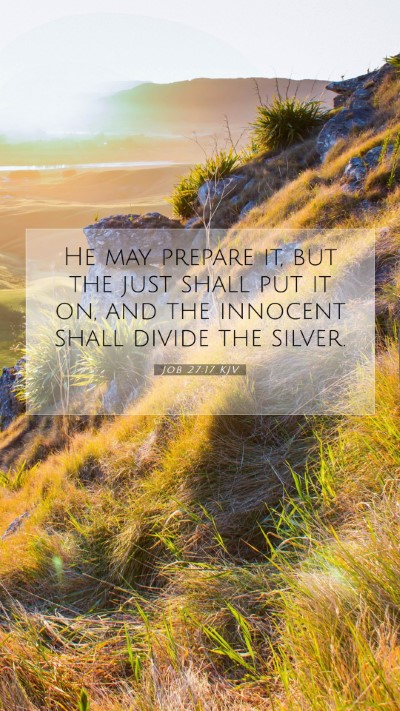Old Testament
Genesis Exodus Leviticus Numbers Deuteronomy Joshua Judges Ruth 1 Samuel 2 Samuel 1 Kings 2 Kings 1 Chronicles 2 Chronicles Ezra Nehemiah Esther Job Psalms Proverbs Ecclesiastes Song of Solomon Isaiah Jeremiah Lamentations Ezekiel Daniel Hosea Joel Amos Obadiah Jonah Micah Nahum Habakkuk Zephaniah Haggai Zechariah MalachiJob 27:17 Meaning
What is the meaning of Job 27:17?
He may prepare it, but the just shall put it on, and the innocent shall divide the silver.
Job 27:17 Bible Verse Meaning
Understanding Job 27:17 - A Comprehensive Commentary
Bible Verse: Job 27:17 - "He may prepare it, but the just shall put it on, and the innocent shall divide the silver."
Introduction to the Verse
Job 27:17 presents a critical insight into the nature of divine justice and moral order as seen through the lens of Job's experience during his trial. This verse encapsulates themes that are recurrent throughout scripture, fitting into larger discussions of righteousness and the fate of the wicked versus the righteous. Understanding this verse requires a grasp of the context of Job's trials and the overall narrative of the book.
Verse Explanation
This verse suggests that while the wicked may accumulate riches and prepare for their own benefit, ultimately, those who are just will inherit these gains. Matthew Henry emphasizes the ultimate triumph of righteousness despite temporary appearances of success by the unjust. In contrast, Adam Clarke provides a nuanced view of the 'just' and 'innocent', noting that they are often those who rely on God and his justice rather than their own means.
Key Insights from Commentaries
- Matthew Henry's Commentary: Henry states that the righteous will ultimately enjoy the wealth that the wicked have amassed, underscoring the concept of divine retribution. He believes that God ensures justice prevails, and the wicked's ill-gotten gains do not last.
- Albert Barnes' Commentary: Barnes points out that Job asserts a timeless principle: in the end, the benefits gained by the unjust will be distributed to the just. He emphasizes that this reflects God's governance of the world where justice is ultimately upheld.
- Adam Clarke's Commentary: Clarke suggests that this verse can be interpreted as a declaration of Job's faith in divine justice, even amidst his suffering. The certainty of the righteous receiving what the unjust have hoarded is a testament to God’s sovereignty.
Historical Context
Understanding this verse is greatly enhanced by its historical context. Job was a man of great wealth and piety who suffered immense loss due to a test of faith orchestrated by Satan. The dialogues throughout the book of Job explore deep themes of suffering, justice, and the human condition. This particular verse encapsulates Job’s declaration of confidence that righteousness will ultimately prevail over wickedness.
Application of the Verse
This verse serves as both a comfort and a challenge for believers. In times of moral injustice and suffering, Job 27:17 reminds us of the ultimate sovereignty of God and the eventual rectitude of divine justice. Those engaged in Bible study groups or online Bible study can find great value in discussing how this verse applies to their lives today.
Cross References
Job 27:17 has several cross references that can deepen understanding:
- Psalm 37:16-17: "Better is the little of the righteous than the abundance of many wicked." This psalm reflects the same principle of divine distribution of wealth.
- Proverbs 13:22: "A good man leaves an inheritance to his children's children, but the sinner's wealth is laid up for the righteous." This reinforces the theme of righteousness receiving the spoils of the wicked.
- Ecclesiastes 2:26: "For to the one who pleases him God has given wisdom and knowledge and joy, but to the sinner he has given the business of gathering and collecting." This echoes the underlying message of Job 27:17.
Conclusion
In conclusion, Job 27:17 serves as a profound statement on justice, offering believers assurance that righteousness will be rewarded by God in the end. This verse invites all readers to reflect on the nature of wealth, the trials of the righteous, and the ultimate justice that God will enact. For those seeking deeper insights into Bible verse meanings and Bible verse interpretations, Job 27:17 is a valuable text that supports ongoing Bible study insights.


